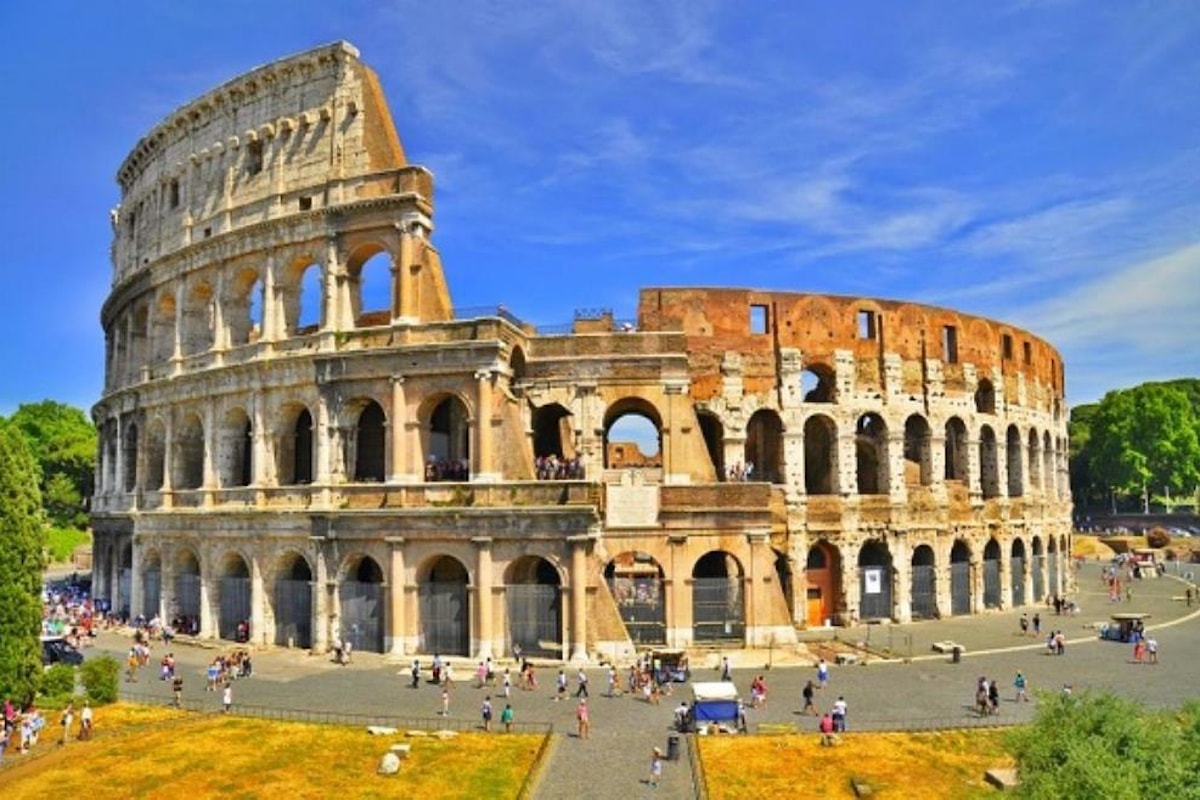The Colosseum, one of the most visited tourist attractions in Rome.
There is nothing more beautiful, enlightening, and entertaining than the ability to speak someone’s language. I have seen and watched videos of white people speaking African languages, thus; you have the ability and the gift also to speak a different language fluently apart from yours.
I am not a teacher and have no teaching experience but my passion for the Italian language will teach any African or Ghanaian, who is interested in speaking Italian. The Italian language is just as beautiful as their food. There are a few reasons it worth to learn Italian even before you visit the country.
Despite that Italy is one of the most beautiful and historically rich countries in the world, it’s a country that citizens don’t often speak English, however, the young ones that have discovered the essence of English are now doing well in the English language.
Let us begin: Like the English language, the Italian language also involves the usage of ‘Masculine and Feminine.’ The combination of your sentence or what you want to say will determine if the subject is feminine or masculine.
Here are two common sentences in masculine and feminine
Un Uomo bello- A handsome man
Plural – Uomni belli. Watch carefully (i) replaced (o) for the plural of man and handsome uomo and - bello
Una donna bella – A beautiful woman (Plural – Le Donne belle) and (e) replaced (a) for the plural of woman-donna and beautiful-bella.
Let’s take ample of verbs, to begin with, 1. Comprare – To buy, 2. Andare – To go, 3. Mangiare – To eat 4. Piangere – To cry, 5. Cantare – To sing, 6. Domire – To sleep. 7. Venire – To come. 8. Avere – To have 9. Volere – To want. 10. Vedere- To see
Now let’s see how to conjugate these verbs to know how they are used
Indictive
Mangiare - To eat
Io mangio – I eat,
Tu mangi – You eat
Lui/Lei mangia – He / She eats
Noi mangiamo – We eat
Voi mangiate – You have eaten (Plural – That is talking to more than one person)
Loro mangiavano – They have eaten.
Just as the conjugation of ‘Mangiare was done, you’ll use the same method for all the verbs. Therefore, the verb ‘Avere – ‘To have’, goes the same
Avere – To have
Io ho – I have
Tu hai – You have
Lui/Lei ha – He/She has
Noi abbiamo – We have
Voi Avete – You have (Plural, talking to more than one person.)Loro hanno – They have
Comprare – To Buy
Io compro - I buy
Tu compri - You buy
Lui/Lei compra - He/She buys
Noi compriamo - We buy
Voi compriate - You buy
Lorro comprammo - They buy
Capire - To understand
Io capisco - I understand
Tu capisci - You understand
Lui/lei capisce - He/She understands
Noi capiamo - We understand
Voi capite - You understand
Lorro - Capiscono - They understand
Now with four examples of conjugation, you can easily conjugate any verb you want.
Now it’s time to construct some common sentences when you are in Rome during the holidays.
Io voglio mangiare il pane – I want to eat some bread
Let’s assume you want to go to Vatican City. In this sentence two verbs are visible (Want and Go). (Volere e andare) Patire also means leaving.
Io Voglio andare il citta’ del Vaticano. (The second underlined verb must fully be used to bring out the meaning to what you want to say or do.
I will repeat with two verbs: I am going to sleep - You can see two actions in this sentence: Going and sleep. The two verbs in Italian are (Andare e domire). If you want to form a sentence with the two verbs, break down the first verb 'Andare and leave the second verb without conjugation, so your sentence will be: Io vado a domire.
Ciao — Hi or bye
Buongiorno — Good morning
Buon pomeriggio- Good afternoon
Buonasera – Good afternoon
Arrivederci — Goodbye
Una buona giornata — Have a good day
Buona serata — Have a good/nice evening
Courtesy is always important when speaking in Italian so you can be considerate and polite; they’ll also help you communicate easily:
· Per favore (pehr fah-voh-reh) (Please.)
· Per piacere (pehr pyah-cheh-reh) (Please.)
· Grazie (grah-tsee-eh) (Thank you.)
· Prego! (preh-goh) (You’re welcome!; By all means, after you.)
· Non c’è di che. (nohn cheh dee keh) (You’re welcome.)
· Mi dispiace. (mee dees-pyah-cheh) (I’m sorry.)
· Mi scusi. (mee skooh-zee) (Excuse me, formal.)
· Scusi, un informazione, per favore. (skooh-zee oohn-een-fohr-mats-yoh-neh pehr fah-voh-reh) (Excuse me, I need some information, please.)
· Scusa. (skooh-zah) (Excuse me, I’m sorry, informal)
· Permesso? (pehr-mehs-soh) (Excuse me — when walking through a crowded train compartment; also, “May I come in?” when crossing the threshold of someone’s house.)
· Sì. (see) (Yes.)
· No. (noh) (No.)
Common questions to enjoy your visit
· Parla inglese? (pahr-lah een-gleh-zeh) (Do you speak English?)
· Chi? (kee) (Who?)
· Cosa? (koh-sah) (What?)
· Quando? (kwahn-doh) (When?)
· Dove? (doh-veh) (Where?)
· Perché? (pehr-keh) (Why?)
· Come? (koh-meh) (How?)
· Quanto? (kwanh-toh) (How much?)
Try these helpful phrases:
· Dov’è la stazione? (doh-veh lah stah-tsyoh-neh) (Where is the station?)
· Scusi, dov’è il bagno? (skooh-zee doh-veh eel bahn-yoh) (Where is the bathroom?)
· Quanto dista il Colosseo? (kwahn-toh dees-tah eel koh-lohs-seh-oh) (How far is the Coloseum?)
· Dove si mangia il miglior gelato? (doh-veh see mahn-jah eel meel-yohr geh-lah-toh) (Where can you get the best ice cream?)
Come si arriva in Piazza della Repubblica?(koh-meh see ahr-ree-vah een pyahts-sah dehl-lah reh-pooh-blee-kah) (How do you get to Piazza della Repubblica?)
Days of the week in Italian
Italian/Abbreviation
Pronunciation
Translation
domenica
doh-meh-nee-kah
Sunday
lunedì
looh-neh-dee
Monday
martedì
mahr-teh-dee
Tuesday
mercoledi
mehr-koh-leh-dee
Wednesday
giovedi
joh-veh-dee
Thursday
venerdì
veh-nehr-dee
Friday
sabato
Sahbatoh
Saturday
Today- Oggi
Yesterday - Ieri (pronounced Yeri)
The easiest part of the Italian is the past tense of most of their words end with 'O,' for example, Andare - To go, the past tense becomes 'Andato, Mangiare- to eat, the past tense becomes Mangiato, etc. Therefore, if you want to say that - I have eaten, just say - Ho mangiato.
Once you are familiar with these, phrases, sentences and questions, you can express yourself without any difficulty when in Italy. There are a few things I would like to add to this article to make it easy for anyone who visits Italy.
Unless you know someone to live with, accommodation in Italy is very difficult but if you have money for a hotel, that will be fine because there are both cheap and expensive hotels.
Due to the Caritas-Charity, under the management of the Roman Catholic, there are several places throughout Italy, to take your bath, to find clothes, to have breakfast, lunch, and dinner.
Some of the places they serve food also serve free nice tasty wines, please be careful not to drink too much to become a victim to pickpockets. Pickpocketing is a common problem in Italy. A man pickpocket in Italian is Borsaiolo and a woman pickpocket is Bordaiola.
Read more of Joel Savage's article here: https://www.modernghana.com/author/JoelSavage




